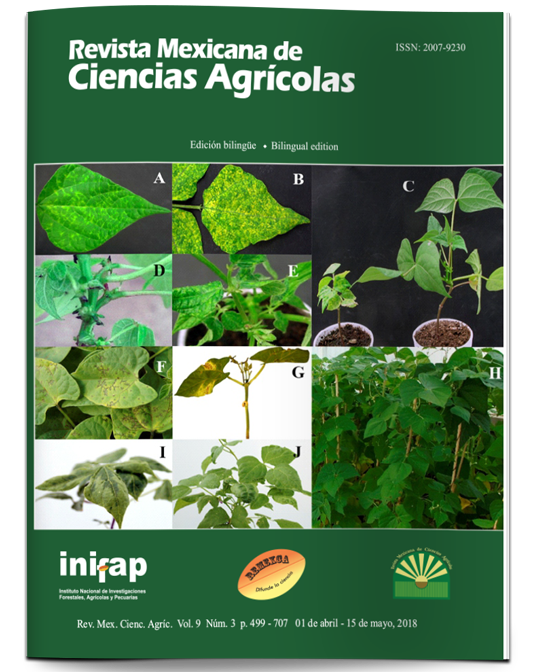In vitro characterization of rhizobacteria and their antagonism with fungi that cause damping off in chili
DOI:
https://doi.org/10.29312/remexca.v9i3.335Keywords:
Capsicum annuum, Fusarium, Rhizoctonia, damping off, rhizobacteriaAbstract
The production of chili seedlings (Capsicum annuum L.) in seedlings is affected by the disease known as “damping off ”. Its prevention and treatment is done regularly by fungicides, whose effects on the fungi that cause this disease are not always effective, but they do represent environmental problems. Given this situation, biological control acquires greater relevance. In the present work three strains of phytopathogenic fungi of the genus Fusarium spp. (FP, FN and FA, by the colors purple, orange and yellow developed, respectively). As for bacterial strains, 18 strains of rhizobacteria (B) were selected, which were compared in vitro with the three strains of Fusarium and one of Rhizotocnia (R). Strain B23 was the most efficient in inhibiting the growth of the phytopathogens studied, reducing the growth of FP, FN and FA (50, 44 and 47%, respectively) and R (56%); the production of AIA varied between 1.24 and 11.32 μg mL-1, the highest solubilization of inorganic phosphate (104 μg mL-1) was obtained with B8. When evaluating the effect of B7, B9, B15 and B23 on the survival of chili seedlings inoculated with Fusarium sp. and Rhizotocnia sp., it was observed that the B7 and B23 strains were the ones that had the greatest effect on the survival of the seedlings during the first 34 days, with values of between 80 to 100%, while in the control seedlings it was between 30 and 50%. On the other hand, strains B8 and B9 were identified molecularly as Pseudomonas chlororaphis; B7 and B14 as Pseudomonas sp.; B15 as Pseudomonas protegens and B23 as Bacillus sp. The presented results show the potential of the use of bacteria as growth promoters and biocontrol agents of fungi causing the damping off in “guajillo” type chili seedlings.
Downloads
Published
How to Cite
Issue
Section
License
The authors who publish in Revista Mexicana de Ciencias Agrícolas accept the following conditions:
In accordance with copyright laws, Revista Mexicana de Ciencias Agrícolas recognizes and respects the authors’ moral right and ownership of property rights which will be transferred to the journal for dissemination in open access. Invariably, all the authors have to sign a letter of transfer of property rights and of originality of the article to Instituto Nacional de Investigaciones Forestales, Agrícolas y Pecuarias (INIFAP) [National Institute of Forestry, Agricultural and Livestock Research]. The author(s) must pay a fee for the reception of articles before proceeding to editorial review.
All the texts published by Revista Mexicana de Ciencias Agrícolas —with no exception— are distributed under a Creative Commons License Attribution-NonCommercial 4.0 International (CC BY-NC 4.0), which allows third parties to use the publication as long as the work’s authorship and its first publication in this journal are mentioned.
The author(s) can enter into independent and additional contractual agreements for the nonexclusive distribution of the version of the article published in Revista Mexicana de Ciencias Agrícolas (for example include it into an institutional repository or publish it in a book) as long as it is clearly and explicitly indicated that the work was published for the first time in Revista Mexicana de Ciencias Agrícolas.
For all the above, the authors shall send the Letter-transfer of Property Rights for the first publication duly filled in and signed by the author(s). This form must be sent as a PDF file to: revista_atm@yahoo.com.mx; cienciasagricola@inifap.gob.mx; remexca2017@gmail.
This work is licensed under a Creative Commons Attribution-Noncommercial 4.0 International license.



